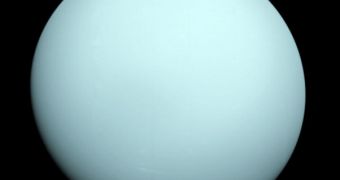As the gas giant presents a tilt of 98 degrees from its orbit plane, during the solstice the poles point directly towards the Sun, triggering some extreme changes in solar illumination, seen in all the bodies in the solar system. This usual inclination presents great importance for planetary astronomers such as Heidi Hammel, aged 47, in the quest to gather more information about the atmosphere and the clime of this planet. The last equinox Uranus when through happened when Dr. Hammel was still in kindergarten.
In fact she has been studying the Uranian equinox for the last few years and even though the exact date when it will start is December 7, its long orbit period around the Sun, which takes 84 years to complete, determines an equinox that will take place for many months to come, while the equinox on Earth takes place in only one day.
This event also presents the possibility of observing some special visual effects, as the rings of the planet edge-on to the Sun, to capture the shadow of one of the moons while moving in front of the planet, scene observable only this year.
However, direct observation of the planet Uranus this time of the year is rather tricky, since it is in opposition with our planet, meaning it is directly on the other side of the Sun. This event took place on September 10 this year, and now, three months later, the planet is visible on the lower part of the sky, for relatively small amounts of time.
To study the equinox that takes place on Uranus, Dr. Hammel will use an alternative method that involves studying Mars' two tiny asteroids that act as moons, Phobos and Deimos, the same way they did in 2003. Back then the observations produced some rather surprising results related to their infrared spectrum so the scientist decided to verify the obtained information this year.
By using the NASA Infrared Telescope Facility on Mauna Kea during the Uranian equinox, Dr. Hammel hopes to correlate the information obtained during Mars' equinox that will take place on December 24, with that of Uranus'.

 14 DAY TRIAL //
14 DAY TRIAL //